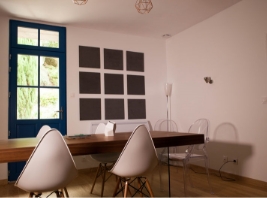Today, noise is a real problem in everyday life: at work, in restaurants, at the sports club, … The situations are numerous and its effects are problematic. But then, how does noise propagate and what can you do to stop hearing it?
How does noise propagate and to stop hearing it?
How does noise propagate and to stop hearing it?
What is noise?
In order to understand the notion of noise, we must first talk about the notion of sound.
Sound is a vibration of the air that is characterized by :
- Its sound level (or sound intensity)
- Its frequency (medium, low or high)
- Its more or less long duration
Noise is an undesirable sound. It is therefore considered harmful, hence the term noise nuisance.
Noise can therefore concern problems of sound insulation or acoustic treatment:
- Sound insulation: noise outside a room (noise from neighbors, transportation, …)
- Acoustic treatment: noise due to the echo of a room (often the case in a restaurant, in places welcoming the public or with high ceilings).
An acoustic panel is an acoustic correction product that allows echoes to be processed. Concretely, it reduces the primary and secondary reflections that generate this phenomenon of reverberation.
How does noise propagate?
The image most used to understand the notion of noise is that of a billiard table.
Concretely, the noise propagates in the same way as a billiard ball. Indeed, if you shoot hard, the ball will propagate for a long time and in a multitude of directions. It is the same with the noise. The louder the volume, the longer it takes for the noise to stop. Indeed, the noise will bounce against the walls of the room (wall, floor and ceiling), just like a billiard ball bouncing against the billiard sides.
This high sound volume can be related to :
- The number of people in the room
- The fact that people speak loudly
- To the piece itself
As mentioned, some rooms favour this noise propagation:
- Rooms with reverberant materials and surfaces (plasterboard, bay windows, …)
- Rooms with large volume and/or high ceilings
- Square or rectangular rooms
Understanding noise propagation in your room
The RT 60
The RT 60 is an indicator that corresponds to the reverberation time of your room. It corresponds to the time it takes for the sound to “turn off” after bouncing off the various walls of your room.
More technically, it corresponds to a sound pressure ratio equivalent to a level decrease of 60 decibels.
In conclusion, if you want your room to be quieter, you should lower the RT60.

Acoustic studies
Further acoustic studies can also help you better understand noise propagation. Our “Ray Tracing” study allows you to better understand the impulse responses of sound in your room.
You will thus understand the “path” of the noise and know your reverberation in great detail.
What can you do to stop hearing noise?
Solutions exist to stop being disturbed by noise.
Play on the decoration
First of all, if the nuisance is very small, playing on decorative elements may be enough. You can, thus, add decorative elements with absorbent properties. This may be enough to correct part of the problem in small rooms.
Otherwise, more efficient and really thought-out acoustic solutions should be used to optimize noise management in your room.
Acoustic solutions

Acoustic solutions are ideal to combat noise problems. They are specially designed for. They have an incomparable efficiency in terms of sound optimization.
Acoustic panels are therefore very useful in this context. Acoustics being a technical and opaque market, we have written tutorials to help you better understand the different solutions on the market and the important things to know. Feel free to read our tutorials on :
- The price of acoustic panels
- Wall and suspended acoustic panels
We are at your disposal for any further information. If you wish to reduce the noise in your room, do not hesitate to contact us.

